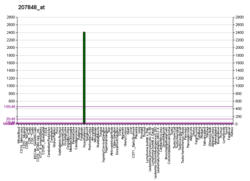Antidiuretic hormone
Vasopressin, also known as antidiuretic hormone (ADH), is a neurohypophysial hormone found in most mammals. In most species it contains arginine and is thus also called arginine vasopressin (AVP) or argipressin. Its two primary functions are to retain water in the body and to constrict blood vessels. Vasopressin regulates the body's retention of water by acting to increase water reabsorption in the kidney's collecting ducts, the tubules which receive the very dilute urine produced by the functional unit of the kidney, the nephrons.
Vasopressin is a peptide hormone that increases water permeability of the kidney's collecting duct and distal convoluted tubule by inducing translocation of aquaporin-CD water channels in the plasma membrane of collecting duct cells. It also increases peripheral vascular resistance, which in turn increases arterial blood pressure. It plays a key role in homeostasis, by the regulation of water, glucose, and salts in the blood. It is derived from a preprohormone precursor that is synthesized in the hypothalamus and stored in vesicles at the posterior pituitary.
...
Wikipedia


